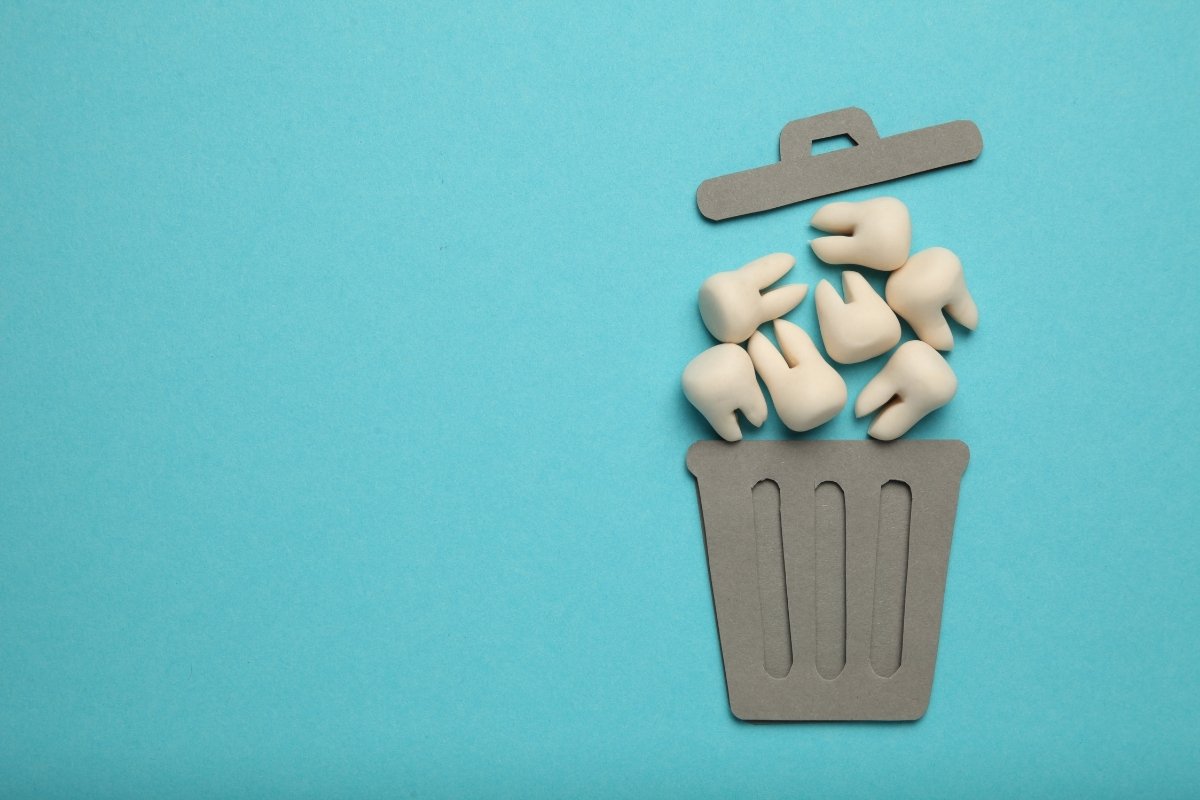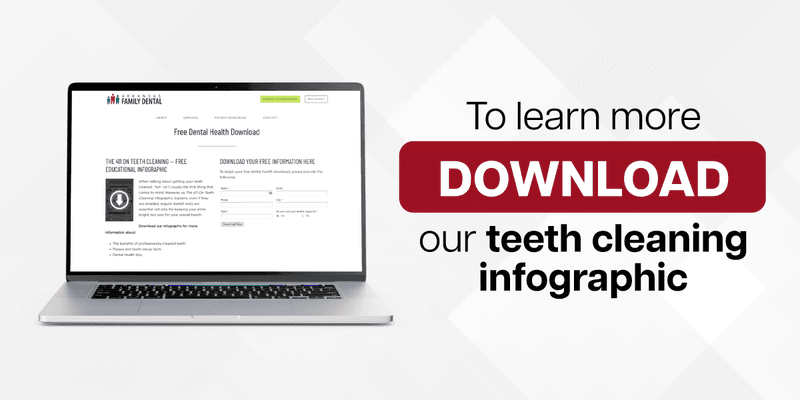Too Gone to Save. Dental Extraction | Tips for Pre-op & Post-op Care

May 5, 2022
Once your tooth develops irreparable damage, dental extraction is the best choice. Following guidelines for pre-op and post-op care after a dental extraction will keep you healthy and make replacement easier.

Extraction Process
After doing an examination with X-rays, the dental extraction process will begin. If you have an impacted tooth, the dentist may need to cut the surrounding gum tissue to allow full access to the tooth needing extraction.
If necessary, the tooth itself will need to be cut into smaller pieces to allow easier extraction. Once the tooth is fully exposed, your dentist uses dental forceps to remove the tooth. Following extraction, gauze is used to apply pressure on the open area in the gums. If needed, the dentist will use sutures to close the area before applying the gauze.
Pre-Operative Dental Extraction Instructions
The following pre-operative instructions are for patients undergoing dental extraction surgery:
- Decide if you’re interested in nitrous oxide to help improve your comfort during the dental extraction.
- Eat a light meal 2 hours before your appointment. After that point, liquids are fine.
- If possible, have someone willing to drive you to and from your appointment. Wear loose-fitting clothing. Contact lenses, jewelry, and any non-permanent dental items should be removed at the time of surgery. If possible, leave these items at home.
- Take all your regular medications on your usual schedule, unless your dentist instructs you otherwise.
Post-Operative Dental Extraction Instructions
- Immediately after your extraction, bite on your gauze for 30 minutes to stop bleeding. If bleeding continues, place another clean gauze and continue to apply pressure. Repeat this anytime there is bleeding, until a clot forms in the extraction area. This clot will close in the area and become gum tissue when it heals.
- For at least 24 hours DO NOT: Smoke, drink through a straw, drink alcohol, carbonated beverages (sodas in any form), or hot liquids, blow your nose, participate in vigorous exercise, or spit a lot. Maintain a soft diet for the rest of the day.
- Food suggestions: warm soup, ice cream, milkshakes, mashed potatoes, (no straw), etc.
- If your pain or discomfort continues beyond 48 hours after your dental extraction, call our office for a re-examination.
- If you are given medications, take them according to the instructions. The following day, start rinsing gently with warm salt water (1/4 teaspoon of salt to 1 cup of water) every four hours.
- After 24 hours, rinse the dental extraction area with warm salt water before and after meals until the area is healed. Doing so will help heal the gums.
- You will likely have swelling around the dental extraction area and facial tissue near the site. The swelling will increase for 24-48 hours before it begins to go down.
- Stiffness of your jaw muscles and face is normal for a few days.
- An earache or sore throat may also occur.
- Due to the surgery, your surrounding teeth may ache. However, this is temporary. Your lips and corners of your mouth may be very dry after a dental extraction. Keep them moist with balm or ointment.
- It is normal to have a slightly elevated temperature for 24 to 48 hours following a dental extraction. However, if an increased temperature continues, contact us. Bruising of the face and mouth after a dental extraction can also occur and is normal.
Women, please note: Some antibiotics may interfere with the effectiveness of your birth control pills. Please check with your pharmacist.
Replacement Options
After you have fully healed from a dental extraction, you can explore replacement options and costs with your dentist. Replacement options for back teeth and front teeth are available for all budgets. Choosing a replacement will help prevent further dental issues down the road. A missing tooth or teeth can cause your remaining teeth to shift out of alignment. It also makes your gums more vulnerable to damage, because the tissue is exposed to abrasion caused by everyday activities like eating.
Dental Bridges
Bridges are an easy answer to a missing tooth or teeth after dental extraction. It is created by using many crowns, which are permanently bonded together, and attached to your existing teeth. A bridge gets its namesake from how it works – it “bridges” the gap left in your teeth from a missing tooth or teeth, while also keeping your remaining teeth in position and protecting your gums. Bridges are created from various materials, including porcelain, metal, and gold. A bridge is an excellent missing back teeth solution.
Full Dentures (Conventional Dentures)
Full dentures, unlike bridges, are removable. They are prosthetic teeth substitutes for people who have had complete removal of their natural teeth. Dentures can be used to replace top, bottom, or both sets of teeth. Dentures are secured using one of two methods: denture adhesives or dental implants. Fit is also important when selecting dentures. If the fit of your dentures is done well, wearing them daily will feel comfortable and more natural. Choosing full dentures is the best economical choice for people who need a solution for large-scale replacements.
Partial Dentures
Partial dentures are created to function the same as a bridge. However, unlike a bridge, they are removable. The partial denture is created using a synthetic material, often acrylic, that resembles your natural gum line, which is held using attachments. Attachments are fitted to the surrounding natural teeth using either metal or acrylic. Dentures, full or partial, will improve the function of the mouth. While crowns and bridges feel more natural, partial dentures are an excellent cost-conscious replacement option.
MDI (Mini Dental Implants)
Mini dental implants (MDI) are small dental implants that consist of a single titanium post, which has a ball and socket that inserts the tooth into position. These implants are almost exclusively used to fix artificial teeth in place and are done in a much shorter time than regular implants. Mini dental implants are a great option for anyone who wants a more permanent replacement after dental extraction.
Implants
Dental implants are done by placing a titanium post into the jawbone and allowing it to heal for around 12 weeks. The titanium post becomes the new anchor, or root, that the artificial tooth will then use. After the new anchor heals, a metal connector is attached to hold the artificial tooth in place. Dental implants offer a permanent and natural-feeling solution for a replacement after a dental extraction. When cared for properly, dental implants will last a lifetime.
Dental Extraction and Replacements in Arkansas
At Arkansas Family Dental, you matter. We understand that extractions and replacements can be overwhelming and even frightening.
We are happy to sit down with you and answer any questions you have about dental extractions, replacement options, or even preventative dental care. If you are concerned that you may need an extraction or want to replace a missing tooth, call 501-381-0471 today to schedule a consultation.
If you'd like to learn more about dental health, download our free information infographic today!

Connect With
Call (501) 232-6273 or request an appointment online to set up your first visit. We’ll be in touch soon.
